

The Worst Film Ever
... View MoreSelf-important, over-dramatic, uninspired.
... View Morerecommended
... View MoreThis is a gorgeous movie made by a gorgeous spirit.
... View MoreAs much as I didn't enjoy reading Ernest Hemingway's novel, I'm so glad I read it before watching the film adaptation of The Sun Also Rises. It's as tailor made to Ava Gardner as The Great Gatsby was to Robert Redford. I can't help but believe Ernest Hemingway and F. Scott Fitzgerald borrowed Jules Verne's time machine, met Ava and Bob, then travelled back to the 1920s and wrote their respective novels. Had I skipped the novel, I would have dismissed the movie as incredibly boring with unlikable characters and a leading lady with no class, low morals, and a sea of unexplained admirers. But that was the core of the book! Peter Viertel's adaptation of the novel was fantastic, keeping the characters and integral dialogues intact but writing scenes that actually flowed and made the audience care about the story-something that was sorely lacking in the novel. Also, a key plot point in the story-the lead character's impotence-was only mentioned once in the novel, and the vague reference went over my head. It wasn't until I was able to follow Viertel's screenplay that I understood the main character's motivations better.Speaking of impotence, that was not a word easily spoken in 1957 Hollywood. While Some Like It Hot was universally credited for the demise of the restrictive Hays Code in 1959, that film was really only the straw the broke the camel's back. 1957 was an extremely groundbreaking year for film censorship. Impotence was openly discussed in The Sun Also Rises, incest and rape were present in Peyton Place, and attitudes towards interracial marriage were exposed in Sayonara. If you're interested in that period of film history, all three of those films are must-sees. In the film, Tyrone Power and Ava Gardner are still in love with each other, even though years have passed and they've decided not to be together. Ava is engaged to Errol Flynn, and Tyrone's friend Mel Ferrer falls in love with Ava at first sight. So, with three men in love with her, there's only one thing to do: take a vacation to Spain with all three of them! The movie famously films bullfights and the Pamplona run, so if you like films that were made on location, you'll want to put this on your list-and it's extremely entertaining to read some backstage stories about the making of this film!Now for the acting, because the technical aspects, music, and screenplay are all very good. Had I not read the novel, I would have dismissed everyone's performances as boring and one-dimensional. Errol is irritable, drunk, and quick-tempered; Tyrone is drunk and cranky; Ava is drunk and crass; Mel is weak and simpering; and Eddie Albert is just drunk. However, that's exactly how the characters were written by Ernest Hemingway! Ava does an extremely good job because all she's doing is playing herself. Tyrone is supposed to be cranky, and Errol is supposed to act like Brian Aherne in The Best of Everything. Mel is supposed to follow Ava around like a puppy dog and gain the audience's sympathy. If I can come up with this much praise for an Ava Gardner movie, it must be good. Do yourself a favor and read the novel first, though. You'll get so much more out of the movie if you do.
... View More. . . seems to be the De Facto subtitle of HEMINGWAY ON FILM (one of the most misleading documentary short namings ever), a "bonus" feature for the 2007 DVD release of THE SUN ALSO RISES (which apparently embarrassed everyone involved so much that they refuse to formally acknowledge the existence of this 23-minute piece at this site). First, out of many dozens of movies based upon Nobel Prize-winning author Ernest Hemingway's novels and short stories, it focuses exclusively on four rather random flicks--all fiascoes, as far as we can learn here. Worse yet, it does not clearly identify two of them (UNDER MY SKIN and ADVENTURES OF A YOUNG MAN) until the end credits roll. About 85% of the attention is devoted to the worst mess of the bunch, THE SUN ALSO RISES. The excuses the two academic talking heads featured here make for Darryl F. Zanuck's misbegotten monstrosity would sound pathetically lame even to someone who has NOT heard SUN screenwriter (and intimate Hemingway pal) Peter Viertel spell it out. The megalomaniac Zanuck used a SUN cast member as his personal pimp, and then invented a major role for the pathetic prostitute who did him on the casting couch. Racist Zanuck ruined the last half of SUN by claiming that actual bullfighter noses were "too big," and placing a STRAY NEW YORK CITY BUSBOY with no acting experience or ability in a crucial role. To muck things up as much as possible, Zanuck also substituted a Haitian-like part of Mexico for the Sweden-like Basque region of Spain. "Papa" H. blew his brains out after this SUN set (wiki it yourself).
... View MoreIf this is a faithful adaption of Hemingway, I can understand why I've never particularly enjoyed reading him. Of course, a bad Hemingway yarn can still a great film make -- as witness Howard Hawks' "To Have and Have Not." Sadly, Henry King and Co. are not up to the task.The film's characters describe themselves as bohemian war veterans, and there's a feeling that what we're watching is supposed to pass for some form of "disillusion" or maybe even "debauchery." But the sad old person's 1950s style American version of extreme Parisian debauchery makes the beach party movies look like porn. Nobody does anything in this movie except drink too much and say idiotic things, occasionally (but not often enough) get into fights, etc. The performances are not bad at all, especially from Mel Ferrer and Errol Flynn. Everybody is too old for their roles, but that's not really the big problem..... the film is caught up in the same old Hollywood dilemma, of how to present broken-down and tarnished humanity without making the glamorous actors and actresses playing them seem drab. As a result, probably due to King's careful direction, everyone acts as if they are hiding under a wet blanket. There's not a moment in the film where anything seems spontaneous. Ty Power was an excellent actor, but Ron Reagan could have played this role with this director just as well. King doesn't know how to use the widescreen to good effect, so he over-uses medium shots and there are a lot of exterior sequences that just feel like travelogues (Leo Tolver had no particular talent for color photography, and simply saturates the screen).I was surprised that the story basically went nowhere, and nothing was revealed about the characters that wasn't obvious immediately. I like Ava Gardner and Tyrone Power, so I was disappointed that they didn't get to take these characters anywhere interesting. Gardner has none of the spontaneity and shine that she shows off in better films like "Barefoot Contessa", and to get a good performance from Power you need to give him some element of regret or self-loathing. I don't really know who would have made this story believable, though. Everyone says the stars should have been younger, but would this be a good film with, say, Grace Kelly and Rock Hudson? No.
... View MoreThere's no other way to describe this other than a major disappointment. On paper it was a great opportunity to finally do right by Hemingway - something that still eludes filmmakers - his first real novel (he had published The Torrents Of Spring, a parody, earlier), an immediate best seller chock full of interesting characters and set against a backdrop of Paris and Pamplona (all Hemingway's novels were set outside the USA, Italy twice, Spain twice, Havana, Paris, the Gulf Stream)all one had to do was acquire the rights, commission a screenplay and assemble the right cast. Aye, there's the rub; where Hemingway's characters were lost youths who had been fighting a war less than a decade before the events described in the novel Fox in their wisdom assembled an over-the-hill gang all, with the exception of Mel Ferrer, possessing fine acting chops but badly in need of a touch of jeunnesse. As drop-dead gorgeous actresses go Ava Gardner turned out consistently fine performances and does so here but only Errol Flynn rings completely true as Mike Campbell and even he is clearly too old for the part. Robert Evans demonstrates why he soon gave up acting - though surely it was vice versa - and is so bad he makes Mel Ferrer look good. Altogether a sad treatment of a landmark, albeit now dated, novel.
... View More